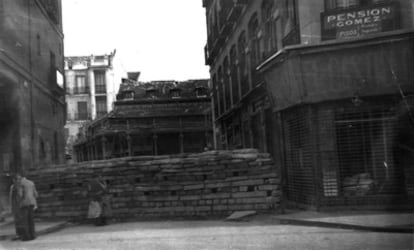An exile's view of the Civil War
Photos taken by a Polish doctor who fought in Spain have been donated to the state
Doctor Emilio Rosenstein was one of 5,400 Poles who did not hesitate to jump into a war that was not initially theirs. Rosenstein, like many Jews in the 20th century, became used to being shuffled across borders, whether voluntarily or not. To study medicine, he had to move to France, because in his own country there were limits on the number of Jews that could attend university each year. In 1929, a year of crisis and uprisings, he became involved in the citizen struggle in France, perhaps with the belief already well implanted that ideals are bound neither by language or territory.
It is this inner premise that he must have brought to Spain, where he registered as a volunteer in the International Brigades under a false name, Emil Vedin, in order to protect his family in Warsaw. His efforts were in vain. According to his daughter Yvonne, he never saw his family again. Like the majority of Polish Jews back then, they were erased from the face of the Earth.
In his first six months in Madrid, Rosenstein tended to more than 700 wounded soldiers, and watched 350 of them die. As a medical captain, he was assigned to the Dabrowski battalion of the XI International Brigade, and later to a Russian tank unit, where he also served as a translator. In the middle of the frenzy that must have surrounded him, he managed to keep up a hobby that would be of immense help in the future to historians: photography. Rosenstein photographed scenes from the front lines and the rearguard in Madrid, Albacete, Guadalajara and other places that have yet to be identified. There is a photograph of Prime Minister Juan Negr¨ªn, Ministers Indalecio Prieto, Vicente Uribe and Jes¨²s Hern¨¢ndez, and Chief of Staff Vicente Rojo huddled together in Barcelona, most likely the day they said goodbye to members of the International Brigade in 1938, according to Severiano Hern¨¢ndez, deputy-director of the State Archives.
For 70 years, the photos followed the escapes, exiles and travels of their author, who died in Mexico in 2001. A few months ago, his daughter, Yvonne Jane Rosenstein Azoulay, decided to donate the archive, which includes 700 photos and 28 rolls of film, to the Culture Ministry's Historical Memory Documentation Center.
"It brings us full circle," his daughter said in December. "He came to Spain to fight for his ideals, and he had some very difficult times here that he found hard to talk about. My father would have really liked to have been here."
There are two collections that are yet to be organized. One documents the colonies of Spanish children in France, where the doctor worked after the dissolution of the International Brigades. The second is a real-life account of the crossing of Spanish Republicans who set sail in the Sao Tom¨¦ from Casablanca for Mexico in 1942. By then, the Polish doctor had taken Spanish nationality - a distinction granted by the Republican government to the Brigades that helped save his life in France after the Nazi invasion.

Tu suscripci¨®n se est¨¢ usando en otro dispositivo
?Quieres a?adir otro usuario a tu suscripci¨®n?
Si contin¨²as leyendo en este dispositivo, no se podr¨¢ leer en el otro.
FlechaTu suscripci¨®n se est¨¢ usando en otro dispositivo y solo puedes acceder a EL PA?S desde un dispositivo a la vez.
Si quieres compartir tu cuenta, cambia tu suscripci¨®n a la modalidad Premium, as¨ª podr¨¢s a?adir otro usuario. Cada uno acceder¨¢ con su propia cuenta de email, lo que os permitir¨¢ personalizar vuestra experiencia en EL PA?S.
En el caso de no saber qui¨¦n est¨¢ usando tu cuenta, te recomendamos cambiar tu contrase?a aqu¨ª.
Si decides continuar compartiendo tu cuenta, este mensaje se mostrar¨¢ en tu dispositivo y en el de la otra persona que est¨¢ usando tu cuenta de forma indefinida, afectando a tu experiencia de lectura. Puedes consultar aqu¨ª los t¨¦rminos y condiciones de la suscripci¨®n digital.








































